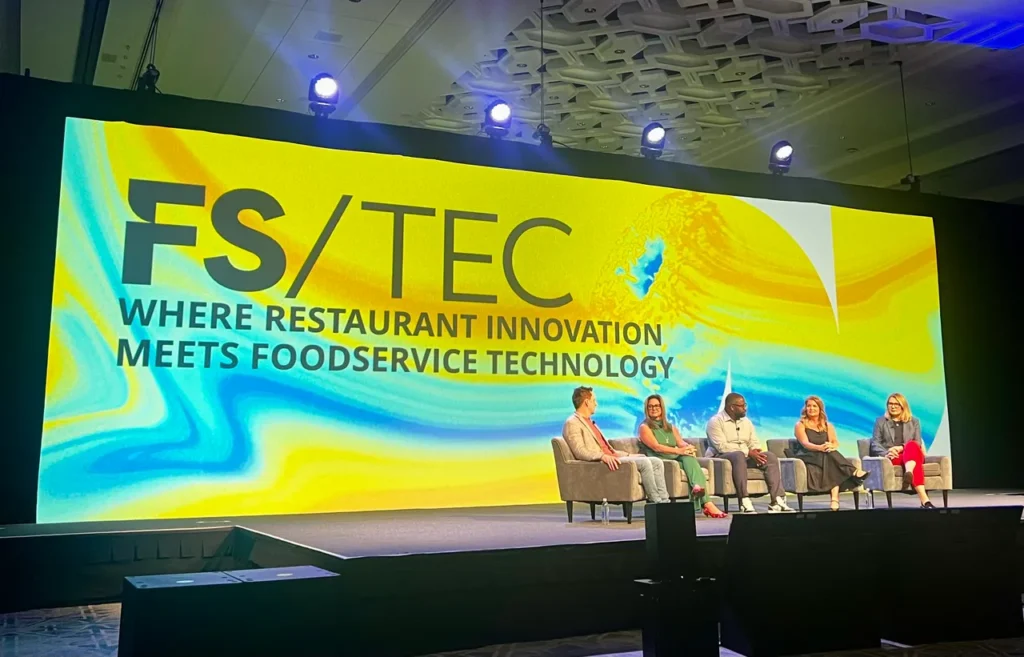How restaurant operators
are using technology to put hospitality
at the forefront
Panelists from all areas of the c-suite discussed the importance of the human touch as a tech complement during FSTEC’s first Inside the Nest panel
15 September 2025
Share this exclusive content from Saladplate

FSTEC opened with The Nest: a conversation between four C-suite leaders. | Photo Credit: Joanna Fantozzi
A few years ago, as AI and automation emerged in restaurants, the industry seemed headed toward touchless, dining room-free experiences. Now, post-pandemic, operators are actively challenging the notion that “human-free” is the future of dining.
Bringing the humanity back to technology investment was one of the major hot-button topics discussed during the “Inside the Nest” opening day panel of the annual FSTEC conference in Kissimmee, Fla. The Nest is a collaborative networking group of industry C-suite leaders who meet both virtually and in-person to discuss some of the most pressing challenges facing the industry.
The panel featured four Nest members from different corners of the C-Suite: Iwona Alter, COO of the Habit Burger & Grill; Jennifer Bell, CMO of Lettuce Entertain You; Kevin Bentley, head of technology and digital for Jollibee; and Jennifer Dodd, CEO of Main Squeeze Juice Co.
“I think from our industry’s perspective, we’re actually starting to get back to the humanized piece of this,” Bentley said. “At the end of the day, [the restaurant industry is] still something that brings people together, whether it’s at home or in our restaurants. There’s a human aspect that we will never get away from. I think we shifted too far left with all the technology, and now we’re starting to roll back and find that balance.”
As operators try to navigate the growing pains of technology investment, many are rethinking employee roles and functions. For example, Alter said that at Habit Burger, there are now 11 possible points of consumer access. To cut down on the confusion and bring a friendly face back into the equation, the company is testing out a new host position at the front of the restaurant.
“We are literally taking our cashier out from behind the counter and putting them in the lobby,” Alter said. “They can help guests use the kiosks or help them find their order for mobile pickup. We’ll see how it plays out, but there’s definitely a lot more texture and intimacy as to how hospitality can happen in restaurants today.”
Another way that operators are using technology to improve hospitality is through data. Dodd said that even though Main Squeeze Juice Co. is relatively small with 27 locations, the company owns its own tech stack and customer data. Recently, Main Squeeze began surveying the top users of the brand’s rewards program, which led to dialogues and focus groups, and eventually real store-level changes.
“What I learned from them that was incredibly valuable for our marketing team was to double down on what brought them to the dance in the first place,” Dodd said. “Like, why did they come to you as a foodservice provider, and what made them stay, and then you really listen to that feedback, like ‘please don’t pasteurize anything.’ That matters to our audience.”
Another challenge of investing in technology is that sometimes it can create friction in the customer experience that was not there before. Bell mentioned an example of her son trying to use a gift card for an unnamed quick-service restaurant chain. He spent 15 minutes trying to figure out how to use the gift card on the brand’s mobile app but eventually gave up and now no longer frequents that brand.
“I was like, ‘gosh, if every time we make a mistake, someone was just done with the brand, that would be really hard,’” Bell said. “I think we have to use technology to work against that friction and go through that customer experience. … I’m such a stickler for this stuff because I want this experience to be seamless for my guests.”
This is the point that all four panelists kept coming back to: technology is not worth the investment unless it is backed by people who are making sure the customer experience is not being compromised for the sake of the shiny new object.
“I’m a firm believer that AI is amazing, but it’s going to need humans to level it up,” Dodd said.

Source: Nation’s Restaurant News



